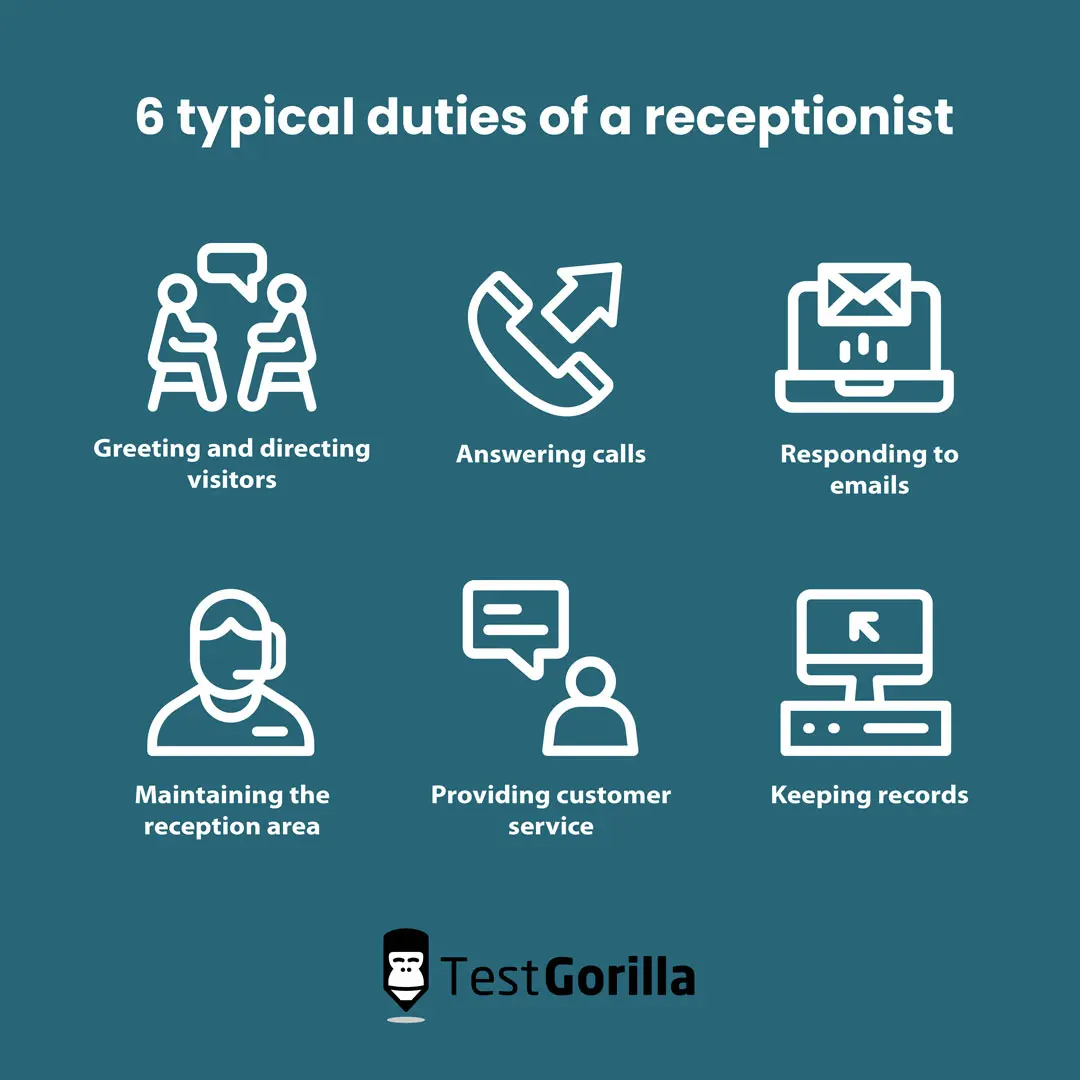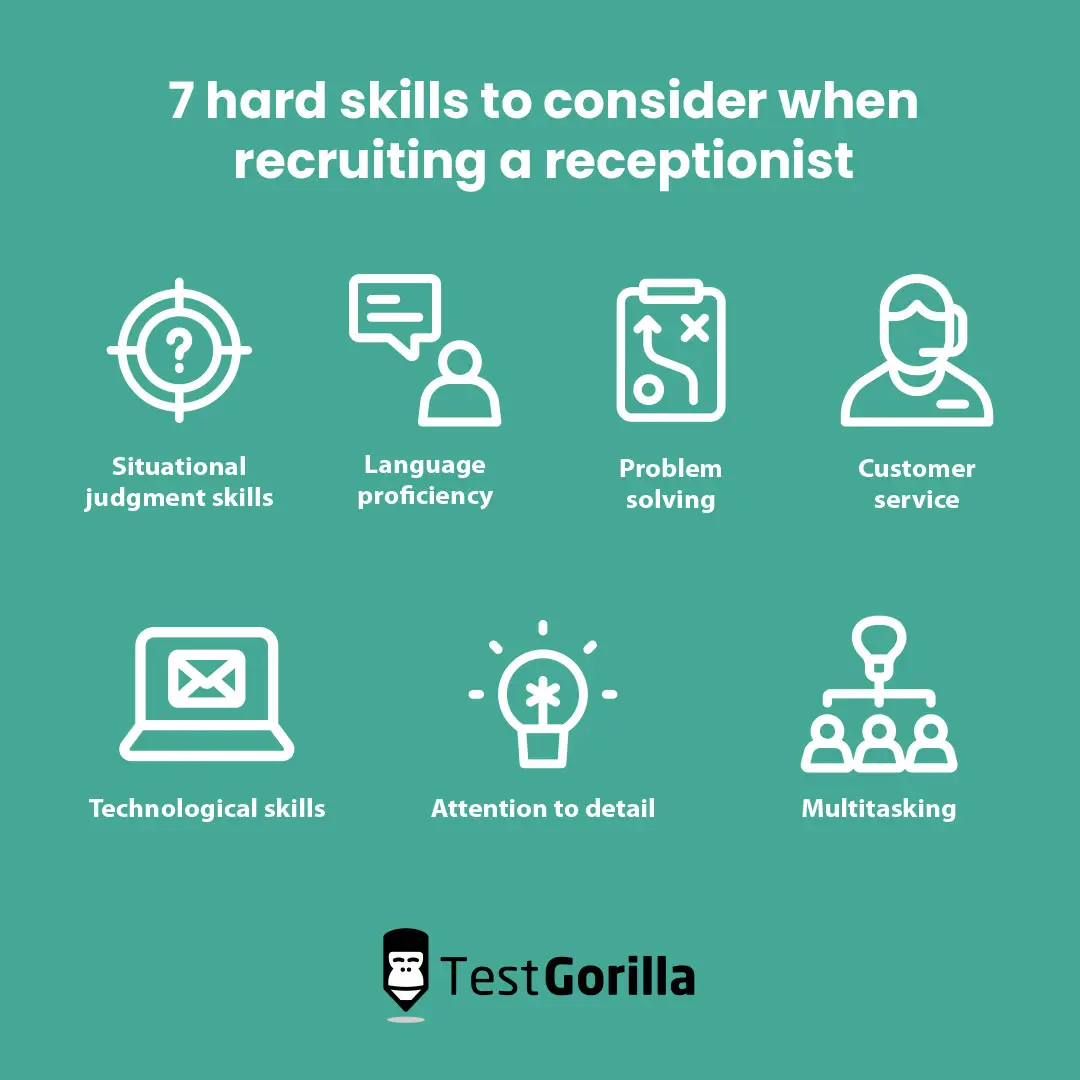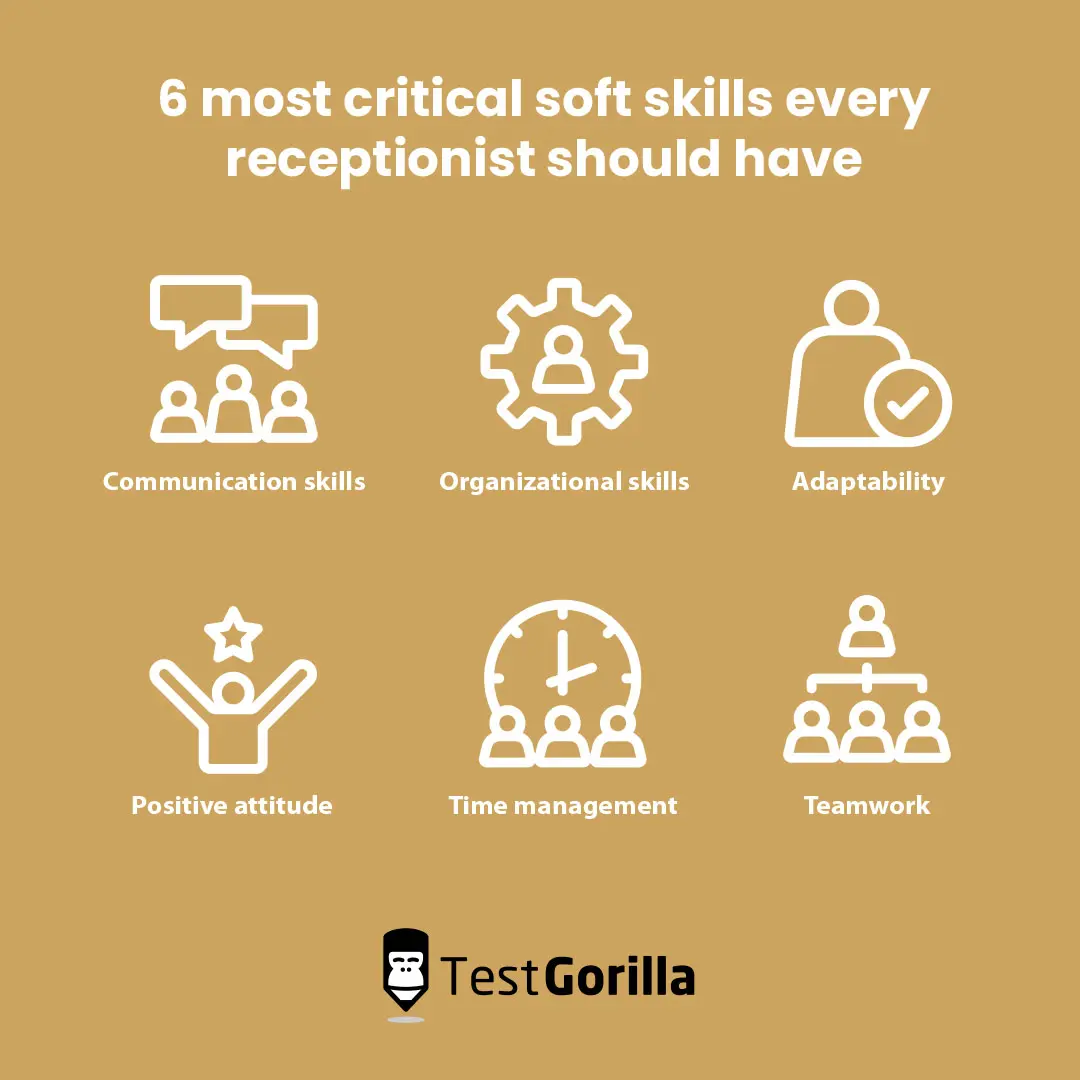If your company needs more hands in handling basic administrative tasks and greeting visitors, you can hire a receptionist. A receptionist is usually the first point of contact between a company and its clients, which makes them a vital part of your office team.
Hiring the right receptionist can make all the difference, if you’re receiving clients or partners in your office. This is because they help create a welcoming and professional image of your organization. For this reason, it’s essential to know how to make the right hiring choice.
In this article, we’ll explain what a receptionist is, and you’ll also learn about their skills and duties. We’ll explore sample interview questions, explain where you can find the best receptionists, and discuss how much receptionists cost.
Further, we will provide a receptionist job-description template and highlight several ways to assess your future receptionist’s skills, including our Customer Service test, which can be really helpful in recruiting expert receptionists.
Table of contents
What is a receptionist?
A receptionist is an employee primarily responsible for receiving and greeting visitors, giving them directions, answering the phone, and assisting with other basic administrative tasks.
In a way, receptionists are the face of the company and play an essential role in creating a positive first impression for visitors.
Receptionists can work in different settings, including medical offices, law firms, hotels, and government agencies. Their role is vital for any business that receives visitors, as they help ensure people’s first impression of the company is positive and build and nurture customers’ trust.
Whether you need to hire a receptionist depends on the size and nature of your business. A receptionist is ideal if your business receives at least several customers daily. Also, if you need help with other admin tasks like organizing office events, they can help you out with those, as well.
According to a survey by Zippia, currently there are over 1.1 million front desk receptionists in the US. This shows how important and impactful receptionists can be for businesses.
Receptionists are responsible for performing various tasks that contribute to your day-to-day operations. Their duties often vary depending on the type of business they are working for, but some of the typical duties of a receptionist include:
Greeting and directing visitors: Receptionists are among the first employees people see after entering the premises. This makes greeting visitors a vital part of the job, as well as guiding them to the right meeting room or the office of the person they’re meeting.
Answering calls: Receptionists answer incoming calls and should be able to handle multiple calls in succession. They also take messages when necessary and route calls to the appropriate person or department in the organization.
Responding to emails: This is another crucial duty, as many customers may prefer email communication. Receptionists need to handle emails promptly, either by providing the right information or forwarding them to the relevant person.
Maintaining the reception area: This is an integral part of a receptionist’s job: They make certain that the area is clean and tidy and that up-to-date magazines and newspapers are available for visitors to read while waiting.
Providing customer service: A survey by HubSpot shows that about 65% of customers expect a response from businesses within 10 minutes of inquiry. If they ask questions at the front desk, a receptionist can provide the answer or swiftly enquire about it from their supervisors.
Keeping records: Keeping records of visitors, phone calls, and appointments is also a vital part of the receptionist’s job. They maintain accurate records and confirm that they are up-to-date and easily accessible.
Receptionist hard skills
There are several skills to look out for in a receptionist. Interestingly, many receptionist roles now require both technical and soft skills.
Below you’ll find a list of hard skills to consider when recruiting a receptionist, along with examples of how they apply in their daily work activities:
1. Situational judgment skills
Situational judgment skills refer to making swift and effective decisions in a given situation. Receptionists should be able to assess any situation and determine the appropriate course of action quickly.
For instance, if a client arrives at the office and demands to see someone immediately, the receptionist needs to determine whether the person they are asking to see is available and can receive them or if another person would be able to handle the client’s request better.
A practical example of the importance of this skill for the role is handling emergency events. Such emergencies can include fire or medical emergencies, for example. Either way, receptionists should take quick action to guarantee the safety of employees and visitors.
They should be intimately familiar with the company’s emergency protocols and be able to act quickly and decisively when needed.
2. Language proficiency
Language proficiency is another crucial skill that receptionists must have to be successful. In today’s global business environment, many businesses interact with clients from around the world – and receptionists should be able to communicate effectively with them.
Depending on your client base and your office’s location, you might need a receptionist that is able to speak, read, and write in multiple languages to answer queries.
For example, if a client who speaks Mandarin arrives at the office, a receptionist who is fluent in Mandarin can communicate with them effectively, making them feel welcome and valued.
Again, if you do business with clients from a particular country or region, a receptionist who speaks the language can be an asset to your company. This makes it easier to establish relationships with those clients and do business with them.
3. Problem-solving
Receptionists should be able to handle unexpected situations with grace and composure. They may face various issues throughout their work, such as technical problems or angry customers, which means it’s essential for them to think on their feet and solve problems quickly.
For example, a receptionist who works in a hotel should be able to resolve customer complaints and handle emergencies. Such emergencies can vary from power outages to natural disasters.
4. Customer service
Receptionists need to have excellent customer service skills so that clients feel welcome and valued. A good receptionist handles inquiries, complaints, and feedback professionally and empathetically.
They’re mindful of customers’ needs and expectations in every situation. Therefore, receptionists are essential in helping you win customers’ trust.
A typical example is a receptionist who works in a guest house. They must greet guests with a warm welcome and provide them with information on the guest house, its amenities, and the area.
5. Technological skills
In today’s modern office, a receptionist requires technical skills to use and maintain office equipment, computer systems, and software programs. In addition, they should have basic skills in digital communication tools, as well as online scheduling and booking systems.
These could include using a computer, scanner, printer, and fax machine to complete various tasks. Technological skills also include proficiency in specific software programs like Microsoft Office and Google Suite.
Also, some roles require knowledge of software tools such as Google Calendar and Salesforce. By possessing these technical skills, a receptionist can work efficiently and effectively, thereby improving the productivity of the business.
6. Attention to detail
Receptionists are often responsible for handling important documents and sensitive information – and need to be able to spot errors and mistakes and correct them quickly. Therefore, it’s essential for the role to have a keen eye for detail to make sure everything is accurate.
Suppose your receptionist has to work with the human resources department to keep records of employees’ working hours. Here, they must be accurate with each employee’s daily arrival time to ensure a reliable assessment by human resources.
7. Multitasking
Receptionists need to be able to handle multiple tasks at once. Excellent multitasking abilities help them to prioritize tasks and manage their time effectively without compromising the quality of their work, especially if they work in a busy environment.
This allows them to function while attending to the demands of every department in the office and that of clients.
Receptionist soft skills
The receptionist role is also evolving to become more than just answering phones and greeting guests. Here are some of the most critical soft skills every receptionist should have. There are also examples of how the skills apply to work in real time:
1. Communication skills
Receptionists should have excellent communication skills to interact effectively with others.
Their communication skills need to encompass both verbal and written communication: They should be able to communicate clearly and professionally, whether in person, on the phone, or via email.
For example, a receptionist who works in a medical office needs to be able to explain medical procedures and insurance information to patients clearly and easily.
2. Organizational skills
Receptionists manage appointments, schedule meetings, and keep track of key documents. For this reason, they need strong organizational skills to make sure that everything runs smoothly. They’re also responsible for managing multiple tasks simultaneously.
Strong organizational skills guarantee that they can prioritize their workload effectively.
Consider a receptionist who works in a law firm. They should keep track of court dates, deadlines, and other important events to confirm that the lawyers are available.
3. Adaptability
The ability to adapt to new situations is critical. This skill is essential when faced with a challenging situation, such as handling an angry client or an unexpected visitor. An adaptable receptionist swiftly assesses the situation and responds appropriately.
Say you closed a deal with an investor, and they decide to come to visit you without prior notice. Your receptionist must be able to quickly reschedule any pre-planned activities and prepare for the investor’s visit accordingly.
A receptionist’s ability to accommodate changes, whether in procedures, staffing, or technology, reflects their adaptability.
4. Positive attitude
A good receptionist will have a positive disposition to maintain a warm and welcoming attitude, even in stressful situations. Their positive attitude helps create a friendly environment that nurtures good client relations.
For instance, a receptionist who greets visitors with a smile, listens attentively to their needs, and offers a solution or assistance with a positive and can-do attitude can enhance the business’s reputation. It can also foster teamwork and collaboration.
You might be surprised that a beaming smile and a warm welcome are all it takes for some customers to want to make a purchase or become loyal to your company.
5. Time management
For receptionists, strong time management skills are critical to attending to all clients and guaranteeing a smooth business operation. Receptionists have multiple tasks to manage and should be able to prioritize and complete tasks efficiently.
For instance, they may use this skill to organize and prioritize assignments, schedule meetings, and answer phone calls and emails promptly. Also, they need to complete administrative duties on time, such as document filing and data entry.
6. Teamwork
A receptionist should be able to work effectively in a team. Collaborating with colleagues to meet the needs of clients and visitors is vital.
This skill allows them to share knowledge, provide support and contribute to the success of the organization. By working effectively in a team, a receptionist can provide a seamless and efficient service to all clients and visitors.
For example, a receptionist may receive a call from a client who needs technical assistance beyond their expertise. In such a situation, the receptionist can partner with the IT team to solve the problem promptly.
For this, they’ll need to provide their coworkers with relevant information about the issue to help them resolve it more efficiently.
Essentially, teamwork is always a useful skill in all organizations, big or small, especially for roles that require constant communication and collaboration with other departments.
How to test receptionist skills
To make a successful hire, it’s crucial to find a candidate who has all the necessary skills and qualities to perform their duties effectively. One way to do this is to use a skills assessment platform.
Pro tip: When choosing a test platform, pick one that allows you to create and use your own tests and add custom questions to existing tests.
TestGorilla has a wide array of pre-employment tests that you can use to identify the best applicants. Plus, on our platform you can create your own assessments and add personalized questions.
Below, you’ll find some of the best pre-screening tests you can use to assess a receptionist’s skills before hiring them.
1. Typing Speed test
A typing speed test is a vital assessment tool, because receptionists will need to type emails, memos, and other correspondence regularly. This test assesses a candidate’s typing speed and accuracy, helping you gauge their ability to handle the required volume of work.
For this, you can use our Typing Speed (Lowercase Only) test or the Typing Speed (Capitalization and Punctuation) test. These tests can help you assess how many words per minute (WPM) a candidate can type using software such as Microsoft Word or Google Docs, which is essential for a receptionist role.
2. Customer Service test
In a survey by Khoros, 83% of customers rated good customer service as the most critical factor when making a purchase. As such, a receptionist’s customer-service skills should be exceptional, and our Customer Service test can help assess those.
This test includes scenarios that simulate common customer service situations, such as dealing with difficult clients or handling complaints. The test assesses a candidate’s ability to stay calm and professional under pressure and anticipate clients’ needs.
3. Attention to Detail test
If you need to assess applicants’ ability to pay attention to details at work, we’ve got you covered.
You can try our or Attention to Textual Detail tests to evaluate a candidate’s ability to maintain accuracy and consistency in their work, which is essential for providing efficient service to clients and visitors.
This test includes tasks that require the candidate to proofread documents, identify errors in data entry, and spot inconsistencies in information.
4. Communication skills test
Our Communication test is an effective way to assess a receptionist’s ability to communicate effectively with clients, visitors, and coworkers.
The test evaluates whether a candidate can converse clearly and concisely, listen actively, and handle sensitive information with discretion. It also evaluates a candidate’s ability to use professional etiquette.
5. Personality tests
A personality test can provide insight into a candidate’s temperament, communication style, and work style. It assesses whether a candidate’s attitudes and behavior are aligned with the company culture and can give you insights on their teamwork skills.
You can use our Enneagram or Big 5 (OCEAN) test to analyze candidates’ personality types. Both tests can evaluate a candidate’s personality traits, their ability to manage emotions, and their approach to others.
You shouldn’t use personality tests to make a hiring decision but they can be an invaluable tool in helping you gain a deeper understanding of your applicants’ predispositions and attitude.
Where to find receptionists
The next step in your search for an expert receptionist is identifying the best places to find one. Here, you should define the methods to use in your search; below are some job platforms that can prove useful:
Online job boards
Online job boards like Indeed, Glassdoor, and LinkedIn are excellent resources for finding expert receptionists to hire. These platforms allow you to post job vacancies and attract candidates from diverse backgrounds.
Staffing agencies
Staffing agencies specialize in recruiting and placing employees in different companies. They have a pool of candidates with diverse skills, experiences, and qualifications. These agencies can help you find an expert receptionist that meets your needs.
They can also handle the recruitment process, including screening, interviewing, and reference checks for you. You can also hire a recruiter or headhunter to find the best person for your business.
Referrals
Referrals from current or previous employees, colleagues, friends, and family can help you find an expert receptionist to hire.
Referrals may be a credible and reliable source of high-quality candidates, because the referring person usually already knows your business and its needs.
Professional associations
Professional associations like the International Association of Administrative Professionals (IAAP) and the National Association of Receptionists (NAR) can also be great resources for finding expert receptionists to hire.
These associations have membership directories where you can search for qualified candidates. You can also attend their networking events and meet with professionals whom you can invite to apply for your open role.
Receptionist job description template
Below is an example of a job description you can use when hiring a receptionist for your business. You can also learn how to write a great job description to create yours from scratch.
Job title: Receptionist
Location: [Insert location]
Reports to: [Insert Manager/Supervisor title]
[SUMMARY]
We are seeking a friendly and professional receptionist to be the face of our organization. The receptionist will be responsible for providing exceptional customer service to clients, visitors, and employees.
They’ll answer phone calls, greet visitors, manage deliveries, and perform various administrative tasks. The successful candidate will be detail-oriented and have excellent communication skills and a positive attitude.
[RESPONSIBILITIES]
• Greet and welcome visitors in a warm and friendly way
• Answer and direct incoming calls to the appropriate department or individual
• Manage incoming and outgoing mail and packages
• Communicate with various departments to ensure the efficient handling of administrative tasks
• Coordinate with the building’s security to provide access to visitors
[REQUIREMENTS]
• High school diploma or equivalent
• Proficient in Microsoft Office Suite and other office software
• Excellent communication skills, both verbal and written
• Strong organizational and time-management skills
• Ability to work independently and as part of a team
[PHYSICAL DEMANDS]
The receptionist may need to stand or sit for extended periods, lift, and move objects up to 20 pounds. They should also be able to hear and speak clearly.
[WORKING CONDITIONS]
The receptionist will work in an office environment and may occasionally need to work on evenings and weekends. They may also need to respond to urgent emails outside work hours.
[SALARY AND BENEFITS]
[Insert salary range and benefits package information]
We are an equal opportunity employer and welcome applicants from all backgrounds and experiences. If you meet the qualifications and have an interest in this opportunity, please submit your resume and cover letter for consideration.
–
You now have a good idea of how to write your job ad. Our detailed receptionist job description template can also help you create a stellar job post.
Receptionist salary
The salary for a receptionist can vary based on factors such as location, industry, and experience. For example, according to the Bureau of Labor Statistics, the median hourly wage for receptionists in the United States is $14.40.
Depending on your industry, receptionist salaries might vary. For example, receptionists in the healthcare industry usually earn more due to the specialized nature of the job.
Additionally, receptionists with more experience or advanced skills may earn a higher salary. For example, according to Glassdoor, a senior receptionist can earn up to $44,449 annually in the US.
Receptionist interview questions
Knowing what questions to ask is a critical part of the interview process. Whether it’ll be online or not, your set of questions should be tactical enough to point you toward the right hire.
You can choose to conduct interviews in several ways. Below are two interview processes that you can use, depending on the situation:
Phone interviews
You can conduct phone interviews to narrow down the candidate pool.
Phone interviews are beneficial for evaluating candidates on basic requirements that don’t require an in-person meeting. They’re also an easy way for you to learn more about the candidate, determine a candidate’s communication skills, and get some insights into their personality type and attitude towards work.
Here are five questions you can ask during a phone interview:
What experience do you have as a receptionist?
What are your skills that make you a good candidate for this role?
What software programs are you proficient in?
Can you give an example of a time when you went above and beyond your duties to serve a customer?
Why did you leave your last company?
In-person or video interviews
You can invite the most promising candidates for an in-person or video interview. Given that full-length interviews can be quite resource-intensive, we recommend pre-screening applicants with the help of skills tests and eventually conducting phone interviews to narrow down your selection.
Remember to ask questions about applicants’ work experience, communication skills, problem-solving abilities, and availability. This interview session allows you to assess a candidate’s attitude to work, soft skills, and interpersonal skills.
Here are some interview questions suitable for longer interviews:
How do you manage demanding customers?
What is your approach to managing sensitive information?
How do you cope with pressure at work?
What is your strategy for managing multiple phone lines and visitors arriving at the same time?
How do you handle a client’s dissatisfaction with their experience?
Use pre-screening tests to make better hiring decisions
Pre-screening tests are an effective tool for hiring any professional. They help you evaluate applicants’ skills and their suitability for the role and the company, which is why using a skill-testing platform like TestGorilla can streamline the hiring process and eliminate bias.
At TestGorilla, we offer several tests designed to evaluate and hire receptionists in our test library. Hiring the best candidate to set up your business for success has never been easier.
Sign up for a free 30-minute live demo today to see for yourself how much easier it can be to hire the right person.
Related posts
Hire the best candidates with TestGorilla
Create pre-employment assessments in minutes to screen candidates, save time, and hire the best talent.
Latest posts
The best advice in pre-employment testing, in your inbox.
No spam. Unsubscribe at any time.

Hire the best. No bias. No stress.
Our screening tests identify the best candidates and make your hiring decisions faster, easier, and bias-free.
Free resources
This checklist covers key features you should look for when choosing a skills testing platform
This resource will help you develop an onboarding checklist for new hires.
How to assess your candidates' attention to detail.
Learn how to get human resources certified through HRCI or SHRM.
Learn how you can improve the level of talent at your company.
Learn how CapitalT reduced hiring bias with online skills assessments.
Learn how to make the resume process more efficient and more effective.
Improve your hiring strategy with these 7 critical recruitment metrics.
Learn how Sukhi decreased time spent reviewing resumes by 83%!
Hire more efficiently with these hacks that 99% of recruiters aren't using.
Make a business case for diversity and inclusion initiatives with this data.




















